新人教版八年级英语下册 Unit 9 Have you ever been to a museum全单元课件
- 格式:ppt
- 大小:3.82 MB
- 文档页数:83
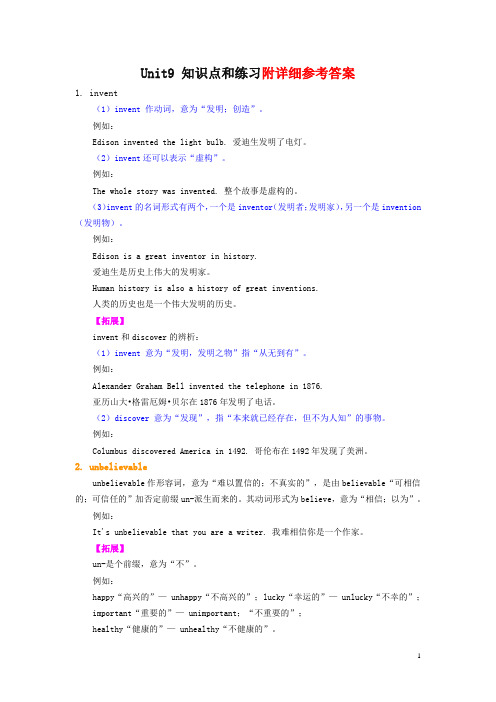
Unit9 知识点和练习附详细参考答案1. invent(1)invent 作动词,意为“发明;创造”。
例如:Edison invented the light bulb. 爱迪生发明了电灯。
(2)invent还可以表示“虚构”。
例如:The whole story was invented. 整个故事是虚构的。
(3)invent的名词形式有两个,一个是inventor(发明者;发明家),另一个是invention (发明物)。
例如:Edison is a great inventor in history.爱迪生是历史上伟大的发明家。
Human history is also a history of great inventions.人类的历史也是一个伟大发明的历史。
【拓展】invent和discover的辨析:(1)invent 意为“发明,发明之物”指“从无到有”。
例如:Alexander Graham Bell invented the telephone in 1876.亚历山大•格雷厄姆•贝尔在1876年发明了电话。
(2)discover 意为“发现”,指“本来就已经存在,但不为人知”的事物。
例如:Columbus discovered America in 1492. 哥伦布在1492年发现了美洲。
2. unbelievableunbelievable作形容词,意为“难以置信的;不真实的”,是由believable“可相信的;可信任的”加否定前缀un-派生而来的。
其动词形式为believe,意为“相信;以为”。
例如:It's unbelievable that you are a writer. 我难相信你是一个作家。
【拓展】un-是个前缀,意为“不”。
例如:happy“高兴的”— unhappy“不高兴的”;lucky“幸运的”— unlucky“不幸的”;important“重要的”— unimportant;“不重要的”;healthy“健康的”— unhealthy“不健康的”。

新目标八年级下册Unit 9 Have you ever been to a museum ?讲义一、重点单词1. amusement n. 娱乐; 游戏2. somewhere adv. 在某处; 到某处3. camera n. 照相机; 摄影机; 摄像机4. invention n. 发明物5. invent v. 发明; 创造1. unbelievable adj. 难以置信的; 不真实的2. progress n. 进步; 进展3. rapid adj. 迅速的; 快速的4. unusual adj. 特别的; 不寻常的5. toilet n. 坐便器; 厕所6. encourage v. 鼓励7. social adj. 社会的8. peaceful adj. 和平的; 安宁的9. performance n. 表演; 演出10. perfect adj. 完美的; 完全的11. itself pron.(it的反身代词) 它自己12. collect v. 收集; 采集13. German adj. 德国的; 德语的; 德国人的n. 德语; 德国人14. theme n. 主题15. ride n. 供乘骑的游乐设施; 短途旅程16. province n. 省份17. simply adv. 仅仅; 只; 不过18. fear v. & n. 害怕; 惧怕19. whether conj. 不管......;还是); 或者......(或者); 是否20. Indian adj.印度的 n. 印度人21. Japanese adj.;日本的; 日本人的; 日语的n. 日本人; 日语22. equator n. 赤道23. whenever conj. 在任何......时候; 无论何时24. spring n. 春天25. mostly adv. 主要地; 通常26. location n. 地点; 位置二、短语归纳1.at night在夜晚2.in a more natural environment在一个更加自然的环境中3.all year round 全年4.be far from 离……远5.in the dark 在黑暗中6.in the past 在过去7.have been to sp. 去过某地8.science museum 科学博物馆9.history museum 历史博物馆10.amusement park 游乐园11.go somewhere different 去不同的地方12.go skating 去滑冰13.take the subway 坐地铁14.a great way to spend a Saturday afternoon一个过周六下午的好方法15.all the old movie cameras所有的古老的电影摄影机16.learn about sth.解有关……的情况17.on the weekend 在周末18.camp in the mountains 在大山里露营19.put up a tent搭帐篷20.in such a rapid way 以如此迅猛的方式21.different kinds of各种各样的22.development of toilets 厕所的发展23.social groups 社会团体24.the tea art performances茶艺表演25.make a perfect cup of tea with beautiful tea sets用漂亮的茶具沏一杯完美的茶26.a nice place to enjoy tea 一个品茶的好地方27.thousands of 数以千计的28.International Museum of Toilets国际厕所博物馆29.the Terracotta Army 兵马俑30.Southeast Asia东南亚31.Night Safari 夜间动物园32.three quarters 四分之三33.an English-speaking country一个讲英语的国家34.have problem doing sth. 做某事很困难35.during the daytime在白天36.a couple of times 好几次37.right now 现在;目前38.an amusement park with a special theme一个有特别的主题的游乐园39.walk around the park 在公园里到处走40.hear of 听说41.take a ride兜风42.another province另一个省43.the Bird’s Nest鸟巢44.encourage sb. to do sth.鼓励某人做某事45.on the one hand... on the other hand.一方面,另一方面三、句型集萃1.a great way to do sth一个做某事的好办法2.It’s unbelievable that很难相信……3.watch sb do sth.看某人做了某事4.encourage sb to do sth鼓励某人做某事5.as..as和。
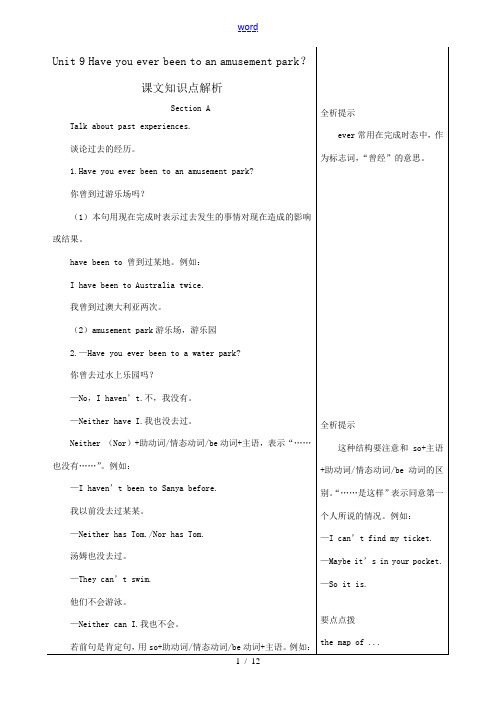

八年级英语下册《Unit 9 Have you ever been to an amusement park 哈利波特主题公园开门迎客英语新闻》文章素材“Harry Potter” star Daniel Radcliffe led groups of excited kids dress ed in Hogwarts uniforms as the Wizarding World of Harry Potter theme park officially opened on Friday to long lines and sna rled traffic.哈利波特魔法世界主题公园于上周五正式开放,开放日当天公园门口排起长队,被堵得水泄不通。
《哈利波特》系列电影的主演丹尼尔雷德克里夫则带领着一群兴高采烈、身穿霍格沃茨魔法学校校服的孩子们畅游乐园。
Radcliffe, Rupert Grint who plays the boy wizard's best friend Ron Weasley, and other actors from the blockbuster movie and book series, were on hand at Universal Orlando as fans lined up more than eight hours to be among the first visitors.当天,雷德克里夫和《哈利波特》系列电影和小说中哈利波特的好友罗恩韦斯莱的扮演者鲁伯特格林特及其它主创都现身奥兰多环球影城,而“哈迷”们则为了成为公园的第一批游客不惜排队等待八个多小时。
Before dawn, the backup of Potter fans began to block the main highway through Orlando near the entrances to Universal, prompting the theme park to open its parking garage at 5 am -- 30 minutes earlier than planned, according to local media.据当地媒体报道,当天天亮之前,环球影城入口附近的市内主要通道已开始被“哈迷”们堵塞,使得主题公园不得不提前30分钟,于凌晨5点就开放了停车场。


Unit 9 Have You Ever Been to an Amusement Park?一、学习目标:1.掌握现在完成时的用法;2.了解一般过去时、现在完成时和现在完成进行时的意义的区别;3.能够准确使用多种时态谈论自己的经历。
二、学习重点难点:1. 现在完成时由主语+have/has+过去分词构成。
其主要用法如下:I.在未指明具体时间的情况下,现在完成时动词通常可以表示在说话之前已经完成,而后果或影响至今仍存在的动作。
例如:The concert has started. 音乐会已经开始。
I have had breakfast. 我已吃过早饭。
注意:have gone to 和have been to 在意义上有区别。
例如:He has gone to Hong Kong. 他到某某去了。
(他已前往某某,或在途中,或已到达。
说话人暗示他现在不在现场。
)He has been to Hong Kong. 他曾到过某某。
(说话人认为他过去到过某某,现在已不在该地。
言外之意他对某某有所了解。
)II. 现在完成时动词可以表示开始于过去持续到现在(也许还会继续进行下去)的动作或状态。
例如:1) I have studied English since last year. 我从去年开始学习英语。
2) She has lived in Beijing for five years. 她住在已经五年了。
注意:e, go , leave, arrive, buy, lose, receive, join, die, bury 和marry 等动词所表示的动作是一时的,不能延续的,故不能与for …,since …等开头的表示一段时间的状语连用。
不过,这些词用于否定句则可以与表示持续的时间状语连用,即动作的不发生是可以持续的。
例如:不能说:*He has e to Beijing for two years.*He has bought that book for three weeks.*He has joined the Army for one and a half years.*His grandma has died for nine months.* I have received his letter for a month.可以说:He has been in Beijing for two years.He has had that book for three weeks.He has been in the army for one and a half years.His grandma has been dead for nine months.I haven't received his letter for almost a month.或者:It is two years since he came to Beijing.It is three weeks since he bought that book.It is one and a half years since he joined the Army.It is nine months since his grandma died.2. 现在完成时把过去的动作和现在的结果联系起来,一般过去时只限于表示过去的动作本身,与现在的结果无关。

Unit 9 Have you ever been to a museum?Section A(1a-2d)知识点一have/has been to去过某地Have you ever been to a science museum?你曾经去过自然博物馆吗?have/has been to意为“曾经去过某地”,但现在已不在那里了。
I have never been to Kunming before.我以前从没去过昆明。
My father has been to Hong Kong many times.我爸爸去过香港很多次。
1.have/has gone to意为“去了某地”,说话时该人不在现场,主语为第三人称。
—May I speak to Mr.Smith?——我可以和史密斯先生通电话吗?—Sorry,he has gone to China.——抱歉,他去英国了。
2.have been in意为“在某地”,表示在某地待了多少时间,常与表示一段时间的状语连用。
They have been in New York for five weeks.他们在纽约五周了。
知识点二反意疑问句It’s really interesting,isn’t it?它真的很有趣,不是吗?这是一个反意疑问句。
反意疑问句是由“陈述句 +附加疑问句”构成,遵循“前肯后否,前否后肯”原则。
此问句可用yes或no来回答。
附加反意疑问部分的主语要用代词,并与陈述部分主语一致,谓语动词在人称、数和时态上也要与陈述部分一致。
Linda won the speaking competition,didn’t she?琳达赢了演讲比赛,是吗?【温馨提示】1.含有never,hardly,seldom等的句子为否定句,反问部分用肯定形式。
2.反义疑问句的回答要“据实回答”,即事实是肯定的,就做肯定回答;事实是否定的,就做否定回答。
—Mary comes from England,doesn’t she?——玛丽来自英国,是吗?—No,she doesn’t.She is from the UAS.——不,不是。

Unit9 Have you ever been to a museum?一、重点词汇及拓展1. amusement n. 娱乐;游戏e.g. The old ladies played the games just for amusement.老太太们玩这个游戏只是为了取乐。
amuse v. 消遣,逗笑;使开心,使愉快amusing adj. 有趣的,好玩的,好笑的amused adj. 被逗乐的;感到好笑的2.amusement park 游乐场e.g. The amusement park is open from May through October.游乐园从五月到十月开放。
3.somewhere adv. 在何处;到某处pron. 某个地方e.g. Maybe the keys are somewhere in the dining room.也许钥匙在餐厅某个地方。
I need to find somewhere to stay tonight.我得找到今晚要住的地方。
4.camera n.照相机;摄影机;摄像机e.g. I heard your parents bought you a cameras as a gift.我听说你的父母亲给你买了一台照相机作为礼物。
5.invention n.发明;发明物e.g. Do you think mobile phone is a great invention?你认为手机是一个伟大的发明吗?6.invent v.发明;创造inventor n.发明家invention n.发明;发明物e.g. As we all know that Edison invented light bulb.我们都知道爱迪生发明了灯泡。
7. unbelievable adj. 难以置信的;不真实的unbelievably adv. 难以置信地;不真实地unbelievably bad/good 坏得/好得令人难以置信incredible adj. 难以置信的e.g. I still find this story both fascinating and unbelievable.我仍然觉得这个故事非常有趣和难以置信。

Unit 9 Have you ever been to an amusement park ?68页1.amusement [ u ] 娱乐、消遣an amusement park 游乐场Have you ever been to an amusement park? 你曾经去过一个游乐场吗?Fun Times Amusement Park 欢乐时光游乐场。
复习have been to 去过,回来了have gone to 去了,现在不在这里have been in 去了,还在那里2. neither① adj. pron 二者都不Neither answer is correctNeither of the answers is / are correct.Which do you like? Neither I think they’re both ugly.② adv. 也不I don’t know. Me neither. I don’t know, either.70页3. Disneyland 迪斯尼乐园(前无冠词)Have you ever been to Disneyland?In fact, there are now several different Disneyland amusement parks around the world. 事实上,现在世界上有好几处不同的迪斯尼游乐场。
around the world = all over the worldacross China = all over China4. Mickey Mouse 米老鼠5. Donald Duck 唐老鸭6. character①性格I know his character very well.②汉字Chinese characters③人物、角色famous characters from Chinese historyDisney characters 迪斯尼人物Mickey Mouse and Donald Duck are famous Disney characters.7. seen see的过去分词。

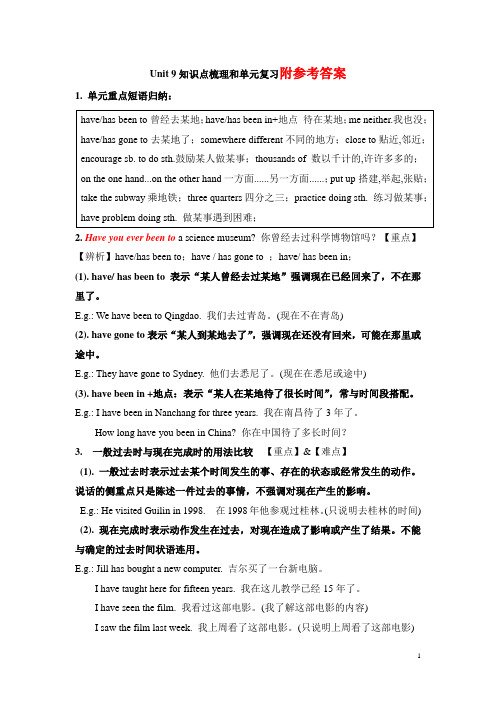
Unit 9知识点梳理和单元复习附参考答案1. 单元重点短语归纳:have/has been to曾经去某地;have/has been in+地点待在某地;me neither.我也没;have/has gone to去某地了;somewhere different不同的地方;close to贴近,邻近;encourage sb. to do sth.鼓励某人做某事;thousands of 数以千计的,许许多多的;on the one hand...on the other hand一方面......另一方面......;put up搭建,举起,张贴;take the subway乘地铁;three quarters四分之三;practice doing sth. 练习做某事;have problem doing sth. 做某事遇到困难;2. Have you ever been to a science museum? 你曾经去过科学博物馆吗?【重点】【辨析】have/has been to;have / has gone to ;have/ has been in;(1). have/ has been to 表示“某人曾经去过某地”强调现在已经回来了,不在那里了。
E.g.: We have been to Qingdao. 我们去过青岛。
(现在不在青岛)(2). have gone to表示“某人到某地去了”,强调现在还没有回来,可能在那里或途中。
E.g.: They have gone to Sydney. 他们去悉尼了。
(现在在悉尼或途中)(3). have been in +地点:表示“某人在某地待了很长时间”,常与时间段搭配。
E.g.: I have been in Nanchang for three years. 我在南昌待了3年了。
How long have you been in China? 你在中国待了多长时间?3. 一般过去时与现在完成时的用法比较【重点】&【难点】(1). 一般过去时表示过去某个时间发生的事、存在的状态或经常发生的动作。


Unit 9 Have you ever been to a museum一、必背短语1.一年到头;终年all year round2.离……远be far from3.在黑暗中in the dark4.在过去 in the past5.去过某地have been to sp.6. 游乐园amusement park7.搭帐篷put up a tent 8.在大山里露营camp in the mountains9.了解有关…的情况learn about sth. 10.以如此迅猛的方式in such a rapid way11.社会团体social groups 12.数以千计的thousands of13.四分之三three quarters 14.一个讲英语的国家an English-speaking country15.在白天during the daytime 16.好几次 a couple of times17. 现在;目前right now 18. 在公园里到处走walk around the park19.兜风take a ride 20.听说hear of22.遗留、留下leave behind21鼓励某人做某事encourage sb. to do sth.23.在某方面取得进步make progress in... 24.一方面on the one hand25.另一方面on the other hand【教材内容解析】Section A1. Me neither (P. 65)me neither意为“我也不……”,表示前者的否定情况也适用于我,反义词为me too。
---Susan can’t play the piano at all.---Me neither.2. Let’s go to one tomorrow. (P. 65)one是不定代词,用来代替前面出现过的可数名词单数,如果指代名词复数,用ones。


人教版英语八年级下册第九单元短语过关Unit 9 Have you ever been to a museum?1. a science museum 一个科学博物馆2. a space museum 一个太空博物馆3. a history museum 一个历史博物馆4.an art museum 一个艺术博物馆5.water park 水上乐园6.amusement park 游乐场7.somewhere different 某个不同的地方;不定副词,后接形容词;例如:For my next vacation , I ‘d like to go somewhere different. 下次度假,我想去个不同的地方。
st year 去年9.at night在夜晚;at noon在中午10.have \ has been to ... 去过...;例如:I have been to a wonderful placewith big gardens. 我去过一个带有很多花园的美景之地。
have \ has gone to ... 去了;例如:She can’t find Mr. Green , he has gone to Beijing. 她不能找到格林先生,他去了北京。
11.go skating 去滑冰12.take the subway 乘坐地铁13.camp in the mountains 在山上野营;例如:During the summervacation , we camped in the mountains and it was fun. 暑假期间,我们在山上野营,非常有趣。
14.put up the tent 搭建帐篷;put up 还可以表示张贴;例如:They putup their tent and slept under the tree.他们搭建好帐篷,在树下睡了。

Unit 9知识点梳理和单元复习附参考答案1. 单元重点短语归纳:2. Have you ever been to a science museum? 你曾经去过科学博物馆吗?【重点】【辨析】have/has been to;have / has gone to ;have/ has been in;(1). have/ has been to 表示“某人曾经去过某地”强调现在已经回来了,不在那里了。
E.g.: We have been to Qingdao. 我们去过青岛。
(现在不在青岛)(2). have gone to表示“某人到某地去了”,强调现在还没有回来,可能在那里或途中。
E.g.: They have gone to Sydney. 他们去悉尼了。
(现在在悉尼或途中)(3). have been in +地点:表示“某人在某地待了很长时间”,常与时间段搭配。
E.g.: I have been in Nanchang for three years. 我在南昌待了3年了。
How long have you been in China? 你在中国待了多长时间?3. 一般过去时与现在完成时的用法比较【重点】&【难点】(1). 一般过去时表示过去某个时间发生的事、存在的状态或经常发生的动作。
说话的侧重点只是陈述一件过去的事情,不强调对现在产生的影响。
E.g.: He visited Guilin in 1998. 在1998年他参观过桂林。
(只说明去桂林的时间)(2). 现在完成时表示动作发生在过去,对现在造成了影响或产生了结果。
不能与确定的过去时间状语连用。
E.g.: Jill has bought a new computer. 吉尔买了一台新电脑。
I have taught here for fifteen years. 我在这儿教学已经15年了。
I have seen the film. 我看过这部电影。

【人教英语】八下Unit+9+Have+you+ever+been+to+a+museum课文重难点详解+Section+ASection A1.—Have you ever been to a science museum?你曾经去过科学博物馆吗?— Yes,I have. 是的,去过。
【解析1】ever 曾经(用于现在完成时。
ever用于疑问句、否定句)—Have you ever seen the film?—No, never.【解析2】have/has been to / have / has gone to / have/ has been in 辨析:⑴have/ has been to + 地名“曾经去过某地”, 现在已经回到原地。
He has been to England twice.他曾经去过英国两次。
(现在已经不在英国了)Have you ever been to the Great Wall?你到过长城吗?(现在已经不在长城上)⑵have gone to“已经去某地了”,说话时该人不在现场。
He has gone to England。
他已去英国了。
(已经不在说话的地方,到达英国或者在去英国的路上)( ) Mary isn’t here. She has ____ the shop.A. been toB. went toC. gone toD. /【2013江苏中考1】A number of tourists ____ Yangzhou many times because it is such a beautiful city.A. have been toB. has been toC. has gone toD. have gone to⑶have been in +地点待在某地,常与时间段搭配。
I have been in Shanghai for three years.2. Me neither 我也没有。
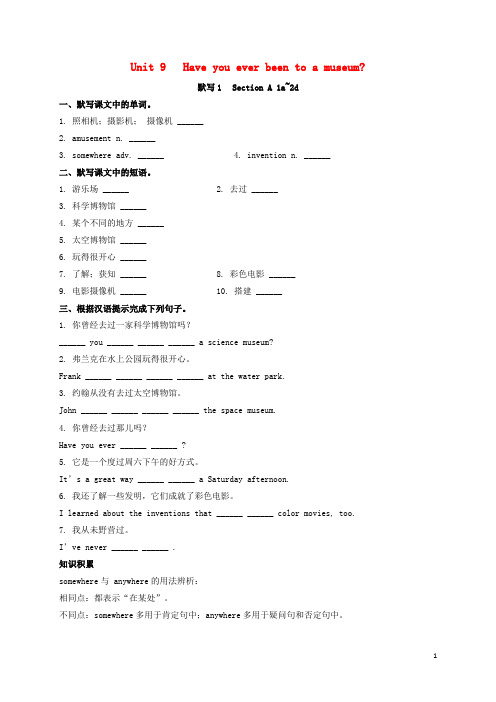
Unit 9 Have you ever been to a museum?默写1 Section A 1a~2d一、默写课文中的单词。
1. 照相机;摄影机;摄像机 ______2. amusement n. ______3. somewhere adv. ______4. invention n. ______二、默写课文中的短语。
1. 游乐场 ______2. 去过 ______3. 科学博物馆 ______4. 某个不同的地方 ______5. 太空博物馆 ______6. 玩得很开心 ______7. 了解;获知 ______ 8. 彩色电影 ______9. 电影摄像机 ______ 10. 搭建 ______三、根据汉语提示完成下列句子。
1. 你曾经去过一家科学博物馆吗?______ you ______ ______ ______ a science museum?2. 弗兰克在水上公园玩得很开心。
Frank ______ ______ ______ ______ at the water park.3. 约翰从没有去过太空博物馆。
John ______ ______ ______ ______ the space museum.4. 你曾经去过那儿吗?Have you ever ______ ______ ?5. 它是一个度过周六下午的好方式。
It’s a great way ______ ______ a Saturday afternoon.6. 我还了解一些发明,它们成就了彩色电影。
I learned about the inventions that ______ ______ color movies, too.7. 我从未野营过。
I’ve never ______ ______ .知识积累somewhere与 anywhere的用法辨析:相同点:都表示“在某处”。
不同点:somewhere多用于肯定句中;anywhere多用于疑问句和否定句中。
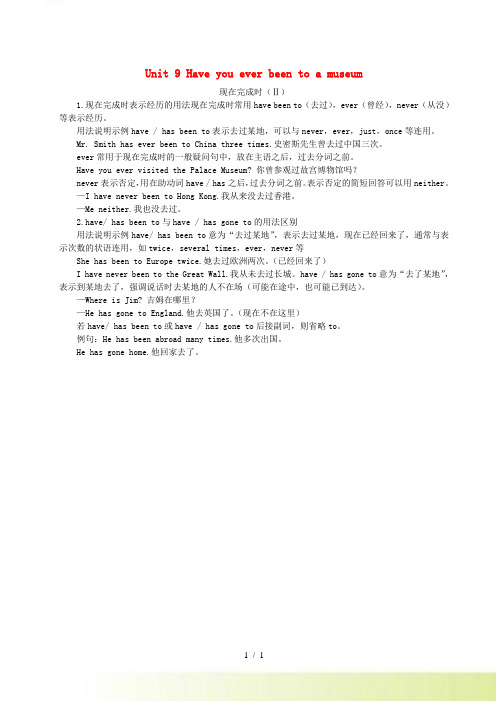
Unit 9 Have you ever been to a museum现在完成时(Ⅱ)1.现在完成时表示经历的用法现在完成时常用have been to(去过),ever(曾经),never(从没)等表示经历。
用法说明示例have / has been to表示去过某地,可以与never,ever,just,once等连用。
Mr. Smith has ever been to China three times.史密斯先生曾去过中国三次。
ever常用于现在完成时的一般疑问句中,放在主语之后,过去分词之前。
Have you ever visited the Palace Museum? 你曾参观过故宫博物馆吗?never表示否定,用在助动词have / has之后,过去分词之前。
表示否定的简短回答可以用neither。
—I have never been to Hong Kong.我从来没去过香港。
—Me neither.我也没去过。
2.have/ has been to与have / has gone to的用法区别用法说明示例have/ has been to意为“去过某地”,表示去过某地,现在已经回来了,通常与表示次数的状语连用,如twice,several times,ever,never等She has been to Europe twice.她去过欧洲两次。
(已经回来了)I have never been to the Great Wall.我从未去过长城。
have / has gone to意为“去了某地”,表示到某地去了,强调说话时去某地的人不在场(可能在途中,也可能已到达)。
—Where is Jim? 吉姆在哪里?—He has gone to England.他去英国了。
(现在不在这里)若have/ has been to或have / has gone to后接副词,则省略to。

Unit 9 Have you ever been to a museum 一、必背短语【教材内容解析】Section A1.Me neither (P. 65)me neither意为“我也不……”,表示前者的否定情况也适用于我,反义词为me too。
---Susan can’t play the piano at all.---Me neither.2.Let’s go to one tomorrow. (P. 65)one是不定代词,用来代替前面出现过的可数名词单数,如果指代名词复数,用ones。
Here are my books. Which one do you want to read?---I don’t like these dresses.---How about those ones over there.3.Let’s go somewhere different today. (P. 65)somewhere用作副词,表示“在某处、到某处”,常用于肯定句中,在否定句和疑问句中用anywhere。
It’s cold here. Let’s go somewhere else.Did you go anywhere last Sunday?4.They are going to take the subway. (P. 66)take the subway意为“乘地铁”,take用作动词,可以表示“乘、坐(车、船等)”。
We take the subway to work every day.5.It’s a great way to spend a Saturday afternoon. (P. 66)(1) way表示“方法”时,后常接动词不定式或者of doing作定语。
Can you think out a way to open the door/of opening the door?(2) spend的用法① sb. spend+时间/金钱+on sth. “在某事上花费多长时间或者多少钱”The man spent the whole day on his speech.The family spent 10,000 dollars on their trip.② sb. spend+时间+(in) doing sth. “花费多长时间做某事”The boy has spent two hours playing the computer games.【拓展】辨析spend, pay, take和cost6.We put up a tent and cooked outside. (P. 66)put up意为“搭建”,还可以表示“举起、张贴”。